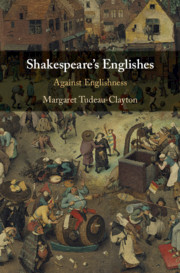Book contents
- Shakespeare’s Englishes
- Shakespeare’s Englishes
- Copyright page
- Epigraph
- Contents
- Table and Illustrations
- Acknowledgements
- Chapter 1 Introduction
- Chapter 2 Shakespeare and ‘the King’s English’
- Chapter 3 Shakespeare and ‘the true-born Englishman’
- Chapter 4 ‘they bring in straing rootes’
- Chapter 5 Figures and Parables of a ‘straing’ Word
- Bibliography
- Index
Chapter 4 - ‘they bring in straing rootes’
Shakespeare and ‘the straingers case’
Published online by Cambridge University Press: 07 October 2019
- Shakespeare’s Englishes
- Shakespeare’s Englishes
- Copyright page
- Epigraph
- Contents
- Table and Illustrations
- Acknowledgements
- Chapter 1 Introduction
- Chapter 2 Shakespeare and ‘the King’s English’
- Chapter 3 Shakespeare and ‘the true-born Englishman’
- Chapter 4 ‘they bring in straing rootes’
- Chapter 5 Figures and Parables of a ‘straing’ Word
- Bibliography
- Index
Summary
This chapter examines how resistance to the ideology of Englishness is expressed through Shakespeare’s vision of human community, especially with respect to ‘strangers’, in early comedies, the second tetralogy and the contribution to Sir Thomas More. Of key importance is the idea put forward through Shakespeare’s More that ‘the strangers’ case’ is at once common and contingent. This idea is shown to find expression in Shakespeare’s use of the word ‘stranger’ and in the phrase ‘straing rootes’ in his contribution to Sir Thomas More. The ‘straying’ into the condition of ‘a stranger’ is dramatised in the early comedies, and brought ‘home’ in the second tetralogy, which depicts the nation as a mix of mutual strangers. This resonates not only with premodern lived experience, but also with biblical figures of the stranger. Of particular importance is a biblical passage that represents the inclusive reach of the gift of redemption in terms of strangers made citizens in the house of God. Referencing this passage The Comedy of Errors engages with ‘the strangers’ case’, like, if less explicitly than the Shakespearean contribution to Sir Thomas More.
Keywords
- Type
- Chapter
- Information
- Shakespeare's EnglishesAgainst Englishness, pp. 132 - 174Publisher: Cambridge University PressPrint publication year: 2019



